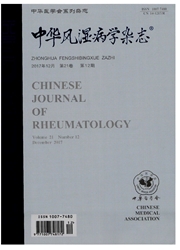

 中文摘要:
中文摘要:
系统性红斑狼疮是一种针对自身抗原产生自身抗体从而形成免疫复合物为特征的慢性炎症性的自身免疫性疾病,能够累及机体的多个脏器(以皮肤、关节、肾脏受累为多见)。系统性红斑狼疮的发病机制涉及到环境、遗传、性别多个因素的相互作用,对于哪个因素在其中起着关键性的作用,是如何诱发疾病的发生,以及在发病过程中的具体作用机制到目前来说还没有一个统一认识。目前许多研究表明,DNA的甲基化可以作为环境、性别等因素的共同作用通路在狼疮的发病中起到一定的作用,现就关于DNA的甲基化与系统性红斑狼疮的关系做一综述。
 英文摘要:
英文摘要:
Systemic lupus erythematosus (SLE) is an archetypical systemic, autoimmune inflammatory disease, of which the mechanism still not unveiled. Studies on epigeneties in SLE have long been the subject of investigation and as part of epigenetics. DNA methylation has been confirmed to play a role in the pathogenesis of SLE. The high autoreactivity of CD4 + T cell from SLE patients is associated with DNA hypomethylation. DNA hypomethylation is crucial to induce SLE - like autoimmune disease in SLE - non - susceptible mice. The reactivation of inactive X chromosome by hy- pomethylation may lead to high incidence of SLE in women. Drug - induced SLE is also connected with DNA hypomethylation. To understand the role of DNA methylation in the onset of SLE comprehensively, we review the findings reported in the literatures about DNA methylation and SLE.
 同期刊论文项目
同期刊论文项目
 同项目期刊论文
同项目期刊论文
 期刊信息
期刊信息
